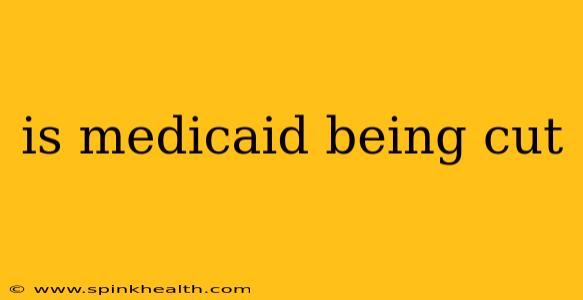Is Medicaid Being Cut? Navigating the Uncertainties of Healthcare Funding
The question of whether Medicaid is being cut is a complex one, with no simple yes or no answer. It's a constantly evolving landscape shaped by shifting political priorities, economic conditions, and ongoing debates about healthcare access and affordability. To understand the current situation, we need to delve into the intricacies of Medicaid funding and the forces that influence its future.
My name is Sarah Chen, and I've spent the last decade researching healthcare policy and its impact on vulnerable populations. I'll guide you through the complexities of this issue, drawing on my experience and reliable sources.
What are the current proposals for Medicaid cuts?
Discussions surrounding Medicaid cuts often occur at both the federal and state levels. At the federal level, proposals for changes to Medicaid funding frequently emerge during budget negotiations. These proposals can take various forms, including altering the federal matching rate (the amount the federal government contributes to state Medicaid programs), imposing stricter eligibility requirements, or capping federal funding. The impact of these potential cuts can vary significantly depending on the specific proposal and the state in question. Some states rely heavily on federal Medicaid funding, making them more vulnerable to reductions. It's crucial to monitor proposed legislation and actively engage in the political process to stay informed.
How might Medicaid cuts affect eligibility?
One potential consequence of Medicaid cuts is a tightening of eligibility requirements. States might increase income thresholds, implement stricter asset limits, or impose new work requirements for beneficiaries. This could lead to a significant number of individuals losing their Medicaid coverage, particularly those in low-income households, people with disabilities, or elderly individuals. This, in turn, would limit access to essential healthcare services, potentially resulting in poorer health outcomes and increased healthcare costs in the long run. Remember that specific eligibility criteria are determined by individual states, adding another layer of complexity to this issue.
What are the potential consequences of Medicaid cuts?
The potential consequences of Medicaid cuts are far-reaching and deeply concerning. Reduced access to healthcare could lead to a surge in preventable hospitalizations and emergency room visits. Delayed or forgone preventive care could result in the worsening of chronic conditions, increasing long-term healthcare expenses. Furthermore, cuts could disproportionately impact vulnerable populations, exacerbating existing health disparities and widening the gap in healthcare access between different socioeconomic groups. The economic consequences extend beyond individual health as well, impacting local economies reliant on healthcare jobs and services.
Are there any states where Medicaid is currently being cut?
The situation regarding Medicaid cuts varies considerably from state to state. While some states might be facing reductions in federal funding or implementing stricter eligibility rules, others are actively working to expand Medicaid coverage. It's essential to research your specific state's Medicaid program to understand its current status and any potential changes. State-level websites and advocacy groups are valuable resources for up-to-date information.
How can I stay informed about changes to Medicaid?
Staying informed about potential changes to Medicaid requires active engagement. Regularly monitor news sources covering healthcare policy, consult your state's Medicaid website for updates, and follow relevant advocacy organizations. Engaging in civic participation, such as contacting your elected officials to voice your concerns, is crucial in influencing policy decisions impacting Medicaid and healthcare access for all.
The question of Medicaid cuts is not static; it's a continuous dialogue shaped by political and economic forces. By understanding the complexities of this issue and actively seeking reliable information, we can better advocate for access to quality and affordable healthcare for all.

